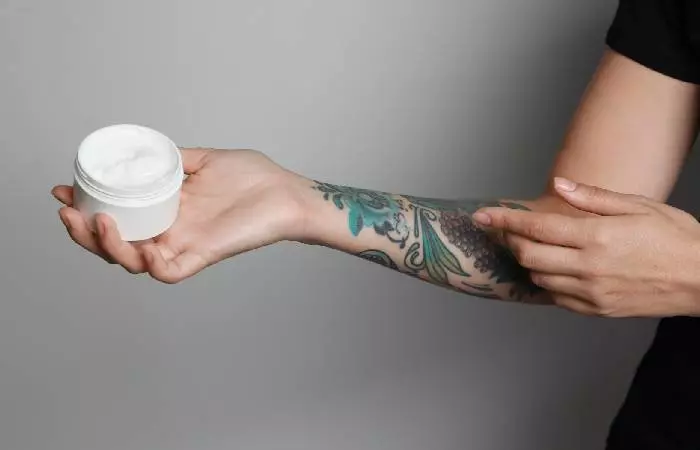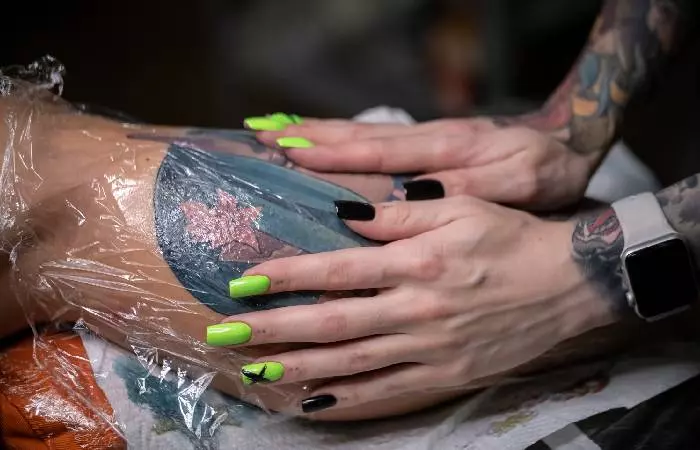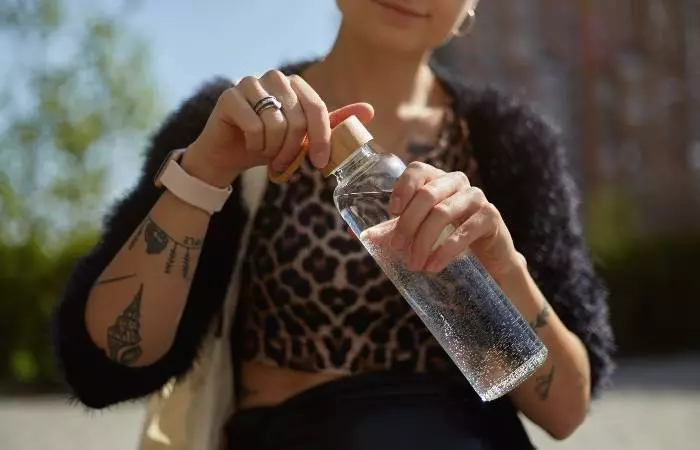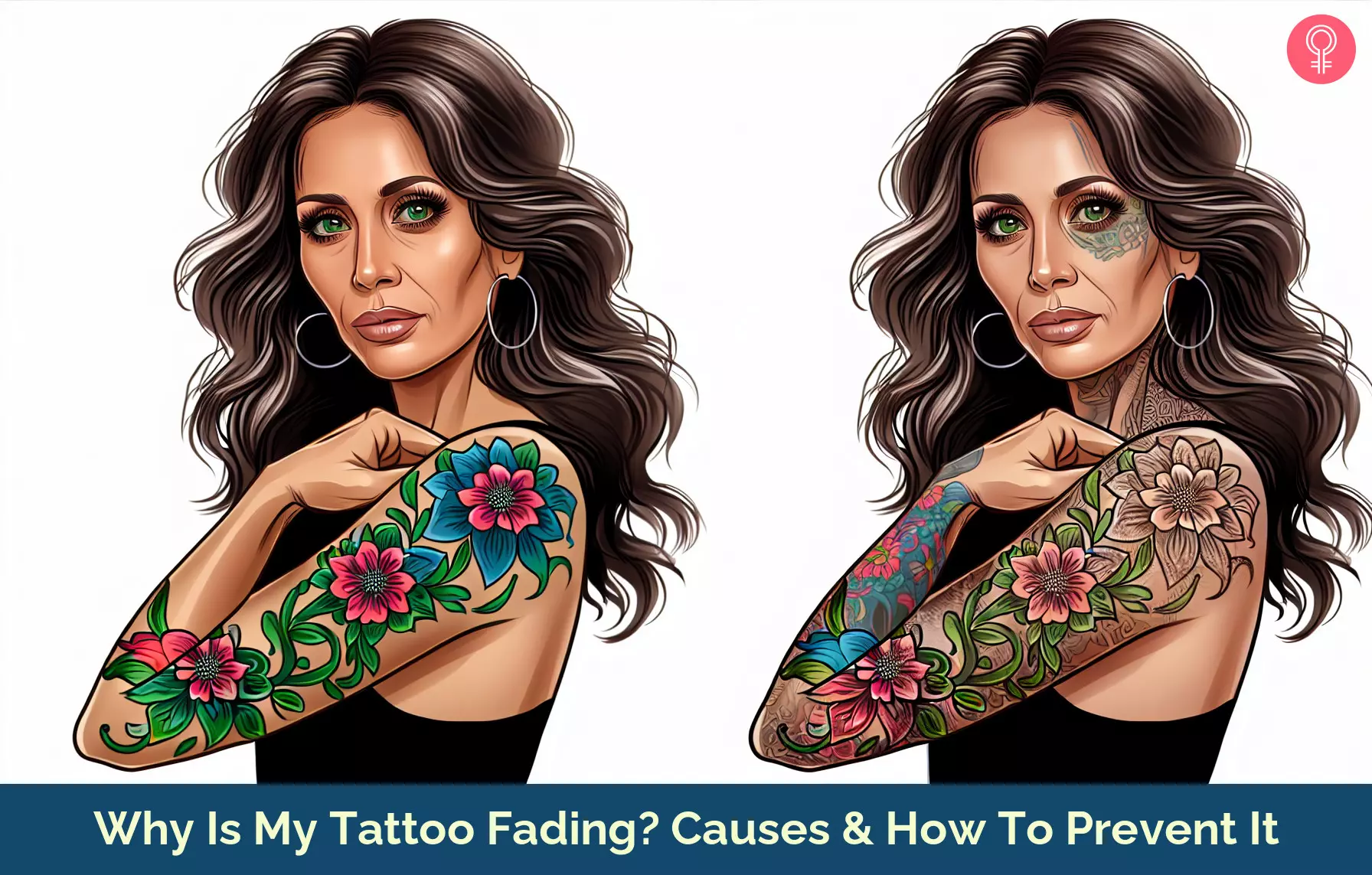
The term permanent tattoo suggests that it is an indelible mark, a symbol of self-expression etched onto our skin that we decide to carry. However, as tattoo enthusiasts are very aware, pigments do fade over time. Tattoo fading is the phenomenon of gradual lightening of body ink. As tattoos age, various factors contribute to their fading – exposure to sunlight, the natural aging process, and insufficient aftercare, all play their roles in this transformation. In this article, we explore why tattoos fade and offer some essential tips to hinder this natural occurrence. Whether you are a seasoned tattoo enthusiast or considering your first ink, understanding these factors is key to keeping your body art vibrant and timeless. Also find out if and how you can fix a faded tattoo and products to ensure your ink stays as brilliant as the day you got it, for as long as possible.
Why Does My Tattoo Look Faded?
It is not uncommon for tattoos to fade over time, where your once-vibrant, beautiful tattoo may lose its original luster. Hence, understanding the reasons behind this may help you preserve that inked masterpiece. Some of these reasons are listed below:
Too much sun exposure without protection is a major contributor to tattoo fading. The UV rays penetrate your tattooed skin to break down the ink pigments and leave your once-dark tattoo looking lighter and less vibrant.
Neglecting Aftercare Instructions
Right after getting inked, your tattoo needs its TLC. Ignoring aftercare advice can lead to infections or ink pulling, making your tattoo more prone to fading. Follow the instructions diligently for a proper tattoo healing process.
Low-quality ink and artistry can affect the longevity of your tattoo. Experienced tattoo artists reach their point of expertise by spending years honing their tattooing process. This offers them the proper tools and know-how to deeply penetrate the dermis for concentrated deposition of high-quality ink, which lasts longer and looks better.
Continuous friction against tight clothing or excessive cleansing and rubbing can irritate your tattooed skin. This irritation triggers a rapid cell renewal rate, which can eventually cause your tattoo to look faded.
 Image: Shutterstock
Image: Shutterstock
Aging skin loses elasticity, which impacts the tattoo ink and causes it to change and fade. While we cannot stop time, we can apply anti-aging creams and take other necessary steps to slow down the aging process for our skin and tattoos.

Tattoos on astronauts are safer in space as the tattoo ink does not fade in zero gravity! The absence of gravity prevents dead skin shedding, thereby keeping the tattoos sharp.
Besides these external reasons which may somewhat be out of our control, the location of the tattoo also contributes to its distortion or fading. Scroll down to learn more about where to place and areas to avoid for your body art.
Do Tattoos Look Better Over Time On Some Body Parts Compared To Others?
Yes, as it turns out, location matters, and some areas are more prone to age-related changes than others.
Best Places To Get Inked
Shoulders And Ankles: The tight skin on shoulders and ankles does not sag much as you age, making these areas ideal for maintaining tattoo vibrancy.Ribs, Outer Collarbone, Back, And Upper Thighs: These are perfect spots to get a tattoo if you want to conceal it under clothes and shield it from direct sunlight.
Worst Places To Get Inked
Hands And Feet: You cannot stop using your hands and feet as you live your life. Hence, constant friction from varying activities and footwear makes tattoos on hands and feet prone to quickly fading.Elbows, Armpits, And Inside Of Arms: These areas also experience frequent movement and rubbing, contributing to faster tattoo wearing off.
In short, when selecting your tattoo placement, consider areas with less friction. The back of the neck, for instance, experiences minimal rubbing compared to your palms or feet. Think about how often your tattoo might face skin-to-skin or skin-to-material contact, and choose wisely to ensure colorful, long-lasting tattoos. Additionally, you can also opt for specific products that can enhance the longevity of your ink. Read on to find out about these aftercare products.
What Kind Of Products Are Good For Tattoo Longevity?
For a tattoo to look vibrant for years to come, the key lies in a few simple yet effective products that can make a world of difference in preserving your ink’s brilliance and improving your skin as a bonus.
Broad-Spectrum Sunscreens
It is your skin’s first line of defense against harmful UV rays. Sunscreens safeguard tattoos by acting as a protective barrier, preventing collagen breakdown that can stretch out your tattooed skin. Moreover, UV exposure can fade and distort tattoo colors over time, leading to a loss of vibrancy.
 Image: Shutterstock
Image: Shutterstock
Regular use of skin moisturizers is a game-changer for daily tattoo care. Hydrated skin decreases the chances of early wrinkles and enhances its overall appearance, ensuring your tattoo stands out. Opt for unscented, tattoo-friendly options with natural ingredients designed to soothe, hydrate, and repair damaged skin post-tattooing.
Much like your sensitive skin, a tattoo also deserves a skincare routine. Beyond the occasional moisturizing, establish a regular routine to keep your skin, and consequently, your tattoo, in top-notch condition. Incorporate a mild, fragrance-free cleanser to gently cleanse the tattooed area. You can also sparingly use non-abrasive exfoliants to remove dead skin cells and maintain tattoo clarity.
Incorporating the above practices into your tattoo care routine can make a significant impact on its longevity. But, what of tattoos that have already faded? Read on to explore the possibility of revitalizing a tattoo that has lost its color.
Can You Fix A Tattoo That Has Lost Its Color?
The good news is, you can give it a fresh look with a touch-up session with your professional tattoo artist. If it is an older tattoo weathered by the sun, a full revamp might be the key. This involves not just refreshing faded colors but also redoing the lines to achieve a polished, good-as-new appearance. Another trick to enhancing an older, blurry tattoo is adding a background and new lines, lending it a crisper look.
While some tattoo artists suggest embracing the natural evolution of tattoos as they age, others prefer the idea of a refreshed, vibrant ink. Ultimately, the decision to fix a faded tattoo is in your hands.
Whether you opt for a complete revamp or let your tattoo gracefully age, the choice is yours. You can also follow these effective tips below to prevent your tattoo fading too soon. Read on to know how.
How To Keep A Tattoo From Fading
Ensuring your tattoo maintains its vibrancy over time, or at least does not lose its original glamor before time, requires some TLC and a few mindful choices.
Practice Proper Aftercare Image: Shutterstock
Image: Shutterstock
The first few hours and days post-tattoo are critical. Follow your artist’s advice of keeping it clean by wrapping it for 24 hours, wash gently with antimicrobial soap, and pat dry to avoid irritation and friction. Over the next few days of the tattoo healing process, maintain cleanliness and moisturize without overdoing it. Follow a dedicated aftercare routine, resisting the urge to scratch or pick at scabs.

Swap your cotton pillowcase and bedsheets for silk to reduce rubbing and allow your tattoo to heal without disturbance, especially if it is on a high-friction area like the arm.
Carefully Consider The Tattoo Placement
Choose body parts that will see minimal friction or sun exposure to avoid premature fading. Consider the back of the neck over palms or feet for greater vibrancy and easy concealment.
Smoking reduces collagen production, affecting the skin’s elasticity to potentially cause ink bleeding, discoloration, and slower healing (1).
Moisturize Your Skin Regularly
Hydrated skin is less prone to becoming dry and causing irritation. Use unscented, organic lotions to keep your skin plump and prevent dryness.
Stay Hydrated And Healthy Image: Shutterstock
Image: Shutterstock
Keep an eye on your daily water intake, especially after getting a tattoo. Hydrating, regular exercising, and maintaining a balanced diet can contribute to overall skin health, thereby impacting the appearance of your tattoo.
Consider Traditional Tattoo Styles
Styles like American traditional, tribal, and Japanese traditional tattoos are known for their longevity due to bold outlines and restrained color palettes.
Limit Tanning Bed Exposure
UV light from tanning beds can cause pigments to fade, affecting your tattoo’s vibrancy. Apply a broad-spectrum sunscreen if you choose to tan.
Be Conscious Of Water And Chemical Exposure
Pools, hot tubs, and salty ocean water can cause fading, especially in the early days of a new tattoo. Limit extended water exposure during the healing period.
Choose A Professional Tattoo Artist
Research reputable artists to ensure proper application, reducing the chances of needle trauma for a long-lasting tattoo.
Opt For Loose Fitting Clothes
Choose looser fits to avoid excessive friction that can cause irritation and improper healing, thereby affecting the final outcome and eventual longevity of the tattoo.
Tattoos serve as enduring expressions of personal stories and symbols. However, the inevitability of a tattoo fading can be mitigated by understanding its various contributors. Factors such as UV exposure, inadequate aftercare, and tattoo quality play pivotal roles in the longevity of your ink. On the other hand, the choice of tattoo placement, adoption of a proper skincare routine, and adherence to healthy practices can contribute to preserving the vibrancy of your tattoos. While the natural aging process will impact the tattoo’s appearance, adopting mindful strategies, such as limiting sun exposure and choosing professional artists, can keep your tattoo looking vibrant for a long time.
Frequently Asked Questions
Why is my tattoo fading after 3 days?
After getting a tattoo, it is common for the skin to scab and peel during the initial healing period. This might make the tattoo appear faded. It’s a natural part of the tattoo healing journey; as the skin heals, the true colors will emerge.
Does Vaseline fade tattoos?
Using Vaseline in moderation during the initial healing phase is generally acceptable as it can act as a protective barrier. However, excessive use may hinder proper airflow and healing. Following your tattoo artist’s aftercare instructions is crucial to avoid complications.
Does coconut oil fade tattoos?
Coconut oil is generally considered safe for the tattoo aftercare period. It helps moisturize the skin, preventing excessive dryness. However, it is essential to use it in moderation, as too much oil can clog pores and slow down the healing process.
Is aloe vera OK for tattoos?
Aloe vera is often recommended for its soothing and healing properties. Applying a thin layer can help with irritation and promote healing. It is essential to use pure aloe vera without added chemicals and consult your tattoo artist for personalized advice.
How quickly do tattoos fade?
The fading rate varies among individuals and depends on factors like sun exposure, aftercare, and skin type. Generally, tattoos may experience some fading over several years, and proper care can slow down this process.
What colors are most impacted by fading?
Lighter colors, especially pastels and whites, tend to fade more quickly than darker hues. Sun exposure and lack of aftercare can contribute to the degradation of colors over time.
Key Takeaways
Tattoo fading is influenced by factors like sun exposure, inadequate aftercare, age, and tattoo quality. Choose low-friction areas for tattoos to age better. The back of the neck is a better area than high-friction zones like the palms and feet. Regular moisturizing, avoiding smoking, staying hydrated, and maintaining a healthy balanced lifestyle can contribute to overall skin health, impacting tattoo appearance over time.
Image: Dall·E/StyleCraze Design Team
Unlock the secrets of why your new tattoo is fading and learn tips to revive it. Check out this insightful video below for some expert advice on preventing and fixing your fading tattoo and regaining lost vibrancy.
References
Articles on StyleCraze are backed by verified information from peer-reviewed and academic research papers, reputed organizations, research institutions, and medical associations to ensure accuracy and relevance. Read our editorial policy to learn more.
Smoking affects collagen synthesis and extracellular matrix turnover in human skin https://pubmed.ncbi.nlm.nih.gov/11966688/Was this article helpful? ReviewerAuthorEditorFact Checker
![]() Dr. Seepika Jaiswal is a cosmetic dermatologist, hair transplant surgeon, and micro pigmentation specialist with 7 years of experience. After completing her MBBS, she went on to do a diploma in weight loss and another in clinical dermatology from the University of London.
Dr. Seepika Jaiswal is a cosmetic dermatologist, hair transplant surgeon, and micro pigmentation specialist with 7 years of experience. After completing her MBBS, she went on to do a diploma in weight loss and another in clinical dermatology from the University of London.
Read full bio of Dr. Seepika Jaiswal
![]() Manjari is a beauty and lifestyle writer with over three years of experience in writing across different niches, including beauty, health, wellness, and technology. She first discovered her passion for writing in school and has since honed her craft to perfection.
Manjari is a beauty and lifestyle writer with over three years of experience in writing across different niches, including beauty, health, wellness, and technology. She first discovered her passion for writing in school and has since honed her craft to perfection.
Read full bio of Manjari Uppal
![]() Madhumati is an associate editor with seven years of professional experience. She has previously worked as an editor, proofreader, and a writer with various organizations, helping her navigate through the various facets of content creation and refinement with ease.
Madhumati is an associate editor with seven years of professional experience. She has previously worked as an editor, proofreader, and a writer with various organizations, helping her navigate through the various facets of content creation and refinement with ease.
Read full bio of Madhumati Chowdhury
![]() Joyce Joyson is a beauty and lifestyle writer with over a year of experience crafting short-form content for the beauty, fashion, and lifestyle niches. She has a triple majors bachelor’s degree in History, Political Science, and Geography from IIS University and a master’s degree in Mass Communication and Journalism from Kristu Jayanti College.
Joyce Joyson is a beauty and lifestyle writer with over a year of experience crafting short-form content for the beauty, fashion, and lifestyle niches. She has a triple majors bachelor’s degree in History, Political Science, and Geography from IIS University and a master’s degree in Mass Communication and Journalism from Kristu Jayanti College.
Read full bio of Joyce Joyson
Leave a Reply